Although his professional life passed in the field of finance, Daniel Pichot has always had a passion for history, the humanities and for charitable causes. Bulgaria entered into his life in the late 1990s when this country was still in need of humanitarian aid. Following an idea of Bulgarians living in France, the French-Bulgarian Solidarity association was set up, initially with purely charitable purposes. But the plural in its name in French is a clear statement that the association would like to go beyond aid with clothing, food or drugs.
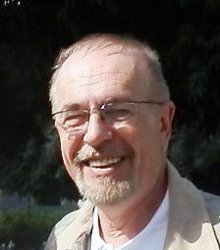
One of the first projects with a more different focus is associated with raising the importance of the Lovech fortress in Northern Bulgaria as a tourist attraction. When in 2000 Daniel Pichot first visited this remarkable historical monument, the medieval fortress was abandoned and overgrown with bushes.
“I saw in the castle a shabby old man who had grazing two goats was there, says Mr. Pichot. I wondered what this man might know about the history of the fortress. But to my surprise, he started telling me numerous stories... And then in my mind a picture formed: in the spotlight, the old goatherd is telling the story of the town and the castle. The next moment the light is redirected to another part of the historical scene and there a new episode of the drama unfolds. Thus the idea was born of a historical performance of the type of a sound and light show but with actors volunteers who would be willing to re-enact the events related to this particular fortress and thus fit it in today's economic revitalization of the town. Later I found out that the poor goatherd was a former history teacher. Apparently he had decided to save the fortress from the bushes by taking his goats there to graze”.
Because the fortress at the time was almost impregnable and strewn with dangerous holes because of the missing iron sewer grates, the performance Daniel Pichot dreamed of could not take place. As a compromise and “rehearsal” for the future performance with a re-enactment of historical events, French-Bulgarian Solidarity Association sponsored in 2005 a performance on historical themes that is played in the local theater with a packed hall.
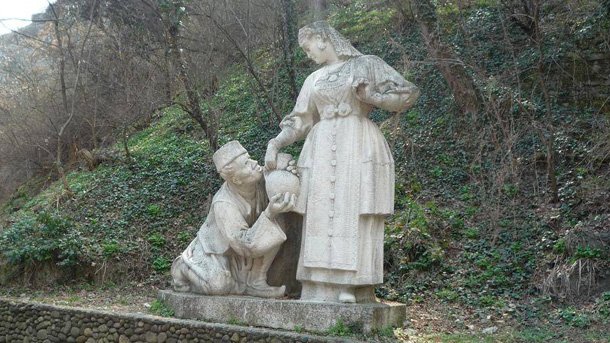
This performance is based on one of the local legends about the doomed love of Greek Yanachko and the beautiful Anasta, a love story that failed to flourish because of the struggle of independence of the Bulgarian Church from the Greek Patriarchate in Constantinople. A huge statue of Anasta and Yanachko can be seen standing to this day near the Osam River. Besides this tragic love, the show tells the story of the struggle for Liberation of Bulgarians in Lovech, of which Anasta, who lived for more than 90 years, was a witness. The song about White Anasta, considered the anthem of the city, goes as a “leit motif” through the whole show. Let’s recall that Alton Lovech was the center of the revolutionary secret organization led by the icon of the Bulgarian liberation struggles, Vasil Levski. Again not far from Lovech he was captured by the Ottoman authorities.
Daniel Pichot devised the show as a strong message to restore the confidence of Bulgarians:
“At that time, the Bulgarians had pretty defeatist sentiments. Everyone said that Bulgaria would never join the EU and that it was not ready. So I wanted to make this show in order to remind them that they are descendants of incredibly brave personalities such as Vasil Levski who have given their lives for Bulgaria’s freedom. And that with such historical heritage Bulgarians need to believe more in themselves, to believe that they can achieve a lot. Symbolically, this was expressed in the show by passing the strings of gold coins from the dying White Anasta to a modern young woman. I think this message of hope was very important because hope makes things move forward,” Mr. Pichot explains.
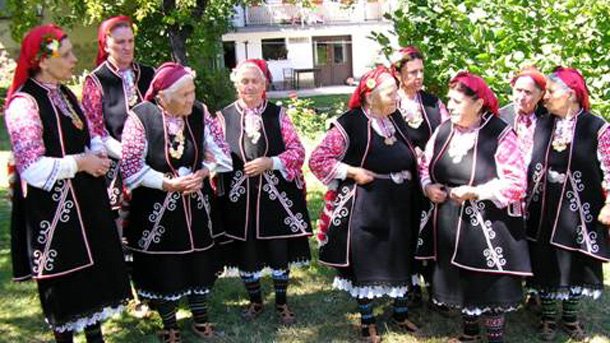
As a result of the idea launched by Mr. Pichot to turn the Lovech fortress into a tourist attraction, it was restored and "sound and light" facilities were installed there. Another step forward was made with the construction of a stage for theatrical performances at the fortress. This highly impressive production called “It revived from the flames and a new state was reborn” with reenactment of historical events was played two or three times at the fortress on the occasion of the 820th anniversary since the signing of the armistice in Lovech between Bulgaria and Byzantium and this was the beginning of the Second Bulgarian Empire But the dream of the French friend of Bulgaria that such performances could turn into a permanent tourist attraction, bringing revenue to the town, as this is done through more than 400 such performances throughout France, still has not come true. For his contribution to the development of Lovech, Daniel Pichot was awarded the title of “honorary citizen”.
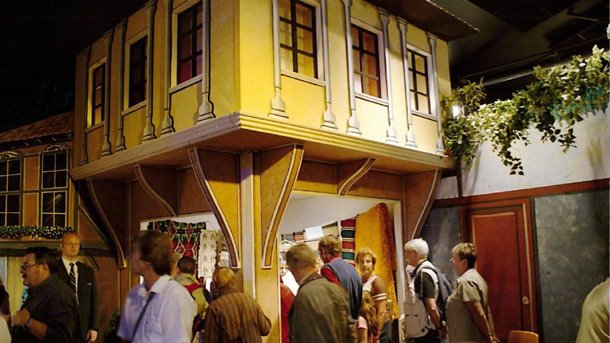
Among the major projects of the association French-Bulgarian Solidarity run by Mr. Pichot was also the presentation of Bulgaria in 2006 as a country which was guest of honor at the exhibition in the town of Le Mans famous for its motor race "24 Hours Le Mans" This is perhaps the most visited event related to Bulgaria in France. In one weekend only during the exhibition the Bulgarian pavilion was visited by over 100,000 Frenchmen.
The challenge was serious”, recalls Daniel. “We were told that before us honored guests were countries like India and China and the bar is set very high. In order to meet the high expectations, the association decided to present this country through the art of the Bistritsa grandmothers whose ancient polyphonic singing is recognized by UNESCO as part of the Intangible World Heritage. And also with copies of some of the landmark discoveries from the time of the Thracian kings, the gold mask of King Teres and the bronze head of Seuthes III. Traditional Bulgarian crafts were shown through demonstrations on the spot of artists from Bulgaria. All this has been accomplished with the invaluable assistance of the Centre for Social Initiatives of Lovech, chaired by Svetoslav Markov.

“It was a huge challenge. The penalty in case of failure of this large-scale enterprise was EUR 50 thousand. But we did well. We had over 100,000 visitors in the weekend during the exhibition. We had 90 Bulgarian participants - singers, dancers, craftsmen and artists. We had a pavilion with an area of 800 square meters, shaped like a village square surrounded by picturesque facades of Bulgarian houses from the National Revival Period. And in the center of the pavilion there stood a model of the church of the Rila Monastery, in the twilight of lighted shop-windows where one could see copies of artifacts from the famous Thracian gold hoards. It was a great achievement and a significant investment both in terms of time and money, and on a personal level”.
Along with these cultural projects, the association continues its charitable work, supporting financially Bulgarian patients requiring treatment in France, such as 17 -year-old Pavel Ivanov of Bulgaria, who was in Paris and had a successful skull surgery. For more than 10 years, French-Bulgarian Solidarity association assists students coming from two elite universities in Lyon, connecting them to homes for parentless children in Bulgaria. During the Christmas and New Year’s holidays, the future engineers and managers from France visit the children from these homes. Besides toys and treats, the students donate to these parentless children their care and love spending with them their entire vacation. They often contribute financially to these homes when making urgent repairs and supplying specialized equipment, etc. “It is a great pleasure to work with these young people who are very daring and give much of themselves”, says Daniel. “One day they will become powerful men in France, and I'm sure they'll think of Bulgaria in their professional projects”.
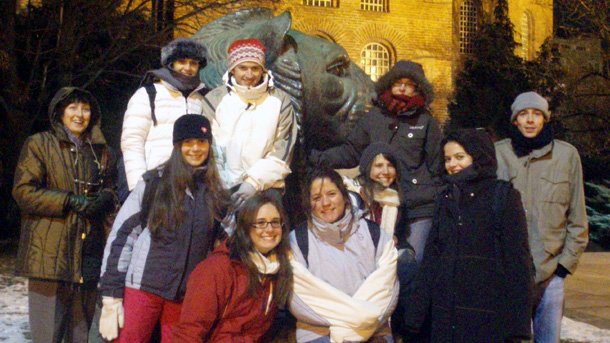
Addicted to history, Mr. Pichot knows about the history of Bulgaria perhaps more than many Bulgarians. He respects deeply the militant traditions of our nation which has resisted five centuries of oppression and admires its courageous leaders such as Vasil Levski. He believes that Levsi’s ideas of the Republic of brotherhood and equality, "a pure and holy republic," in which all nations would have equal rights are the basis of the remarkable feat of Bulgarian people which saved its nearly 50,000 Jews from deportation during World War II.
“A less-known fact is that the Bulgarian authorities during World War II issued transit visas for entry into the country to another 15,000 Jews from other European countries which later moved to Palestine and other parts of the world, adds Daniel. And another fact that is kept silent is that Bulgaria is the only country which saved from deportation also its Gypsies, also persecuted by Nazism. No other nation in Europe had that courage”.
English: Rossitsa PetcovaPresident Rumen Radev will today attend the opening ceremony of Forest Week in front of St Alexander Nevsky Cathedral. The theme of this year's celebrations is "A century of eternal creation, preservation and care!" This year marks the 100th..
For 100 years, foresters in Bulgaria have been organizing Forest Week. A concert entitled “A century of eternity” on 7 April will give the official start to the initiative dedicated to the planet’s lungs. And though it has been a century since..
The eagerly-awaited Tulip Parade at the University Botanical Garden in Balchik is at its peak. This year’s parade includes more than 45,000 bulbs, and 27 varieties that are new to the Garden, among them Tulipa "Carnaval de Nice, which combines..
In 2024, Bulgaria has 15,737 foreign students, making up 8.6% of all current students in the country. By comparison, this share has doubled over the..
The eagerly-awaited Tulip Parade at the University Botanical Garden in Balchik is at its peak. This year’s parade includes more than 45,000 bulbs,..
For 100 years, foresters in Bulgaria have been organizing Forest Week. A concert entitled “A century of eternity” on 7 April will give the official..

+359 2 9336 661
